Analyzing Group Work: Contrasting Field Theory with Social Exchange
VerifiedAdded on 2023/06/03
|8
|2053
|309
Essay
AI Summary
This essay provides an overview of group work theories, focusing on field theory and social exchange theory, and contrasts them. Field theory emphasizes the interaction between an individual and their environment, while social exchange theory explains behavior as a result of cost-benefit analyses in relationships. The paper discusses how these theories shape human behavior within group settings, highlighting their different approaches and underlying concepts. It concludes that understanding these theories is essential for improving group work dynamics and fostering effective communication and collaboration among group members, which can be achieved by understanding the potential of every person. The study of human behavior is crucial for a successful group and is possible with the help of field theory and social exchange theory.
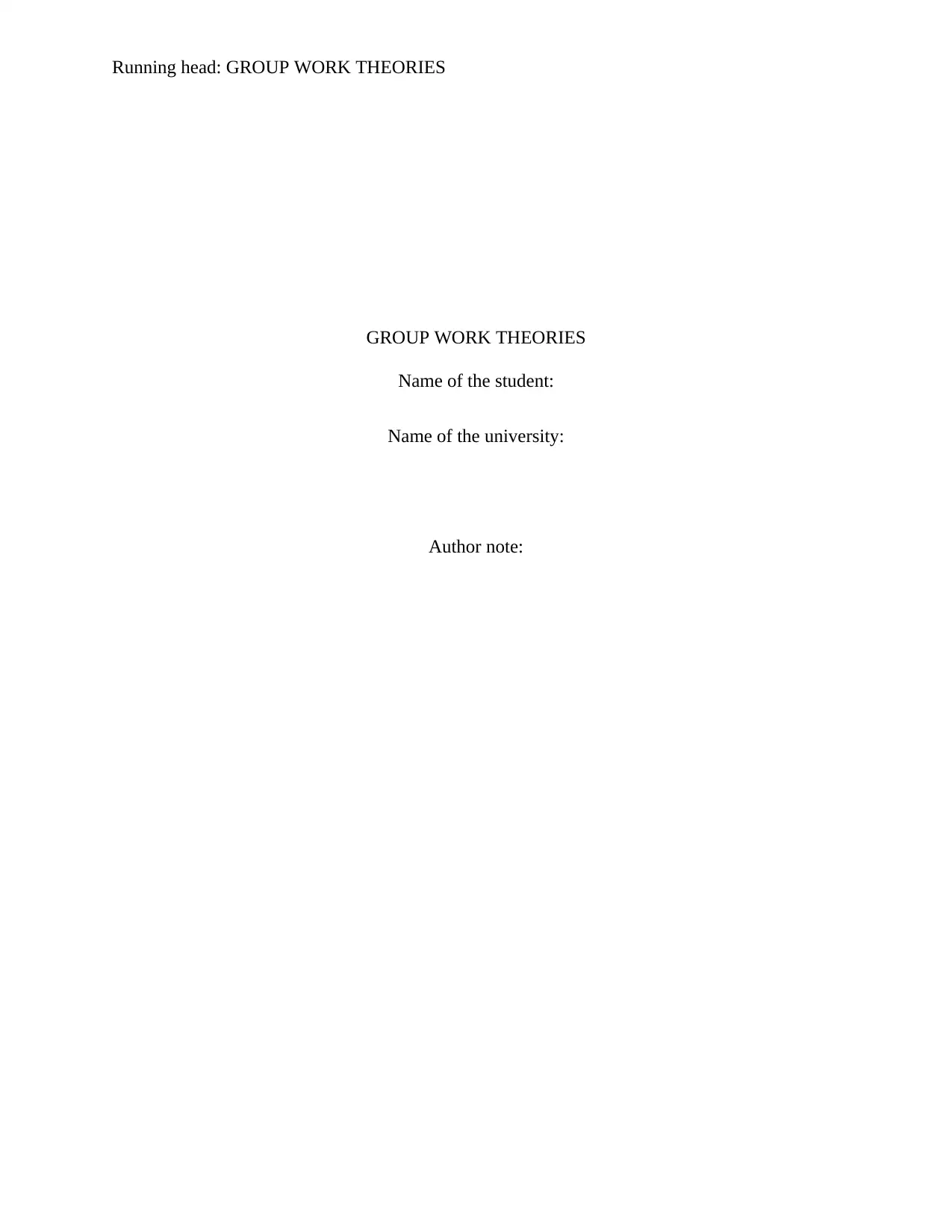
Running head: GROUP WORK THEORIES
GROUP WORK THEORIES
Name of the student:
Name of the university:
Author note:
GROUP WORK THEORIES
Name of the student:
Name of the university:
Author note:
Paraphrase This Document
Need a fresh take? Get an instant paraphrase of this document with our AI Paraphraser
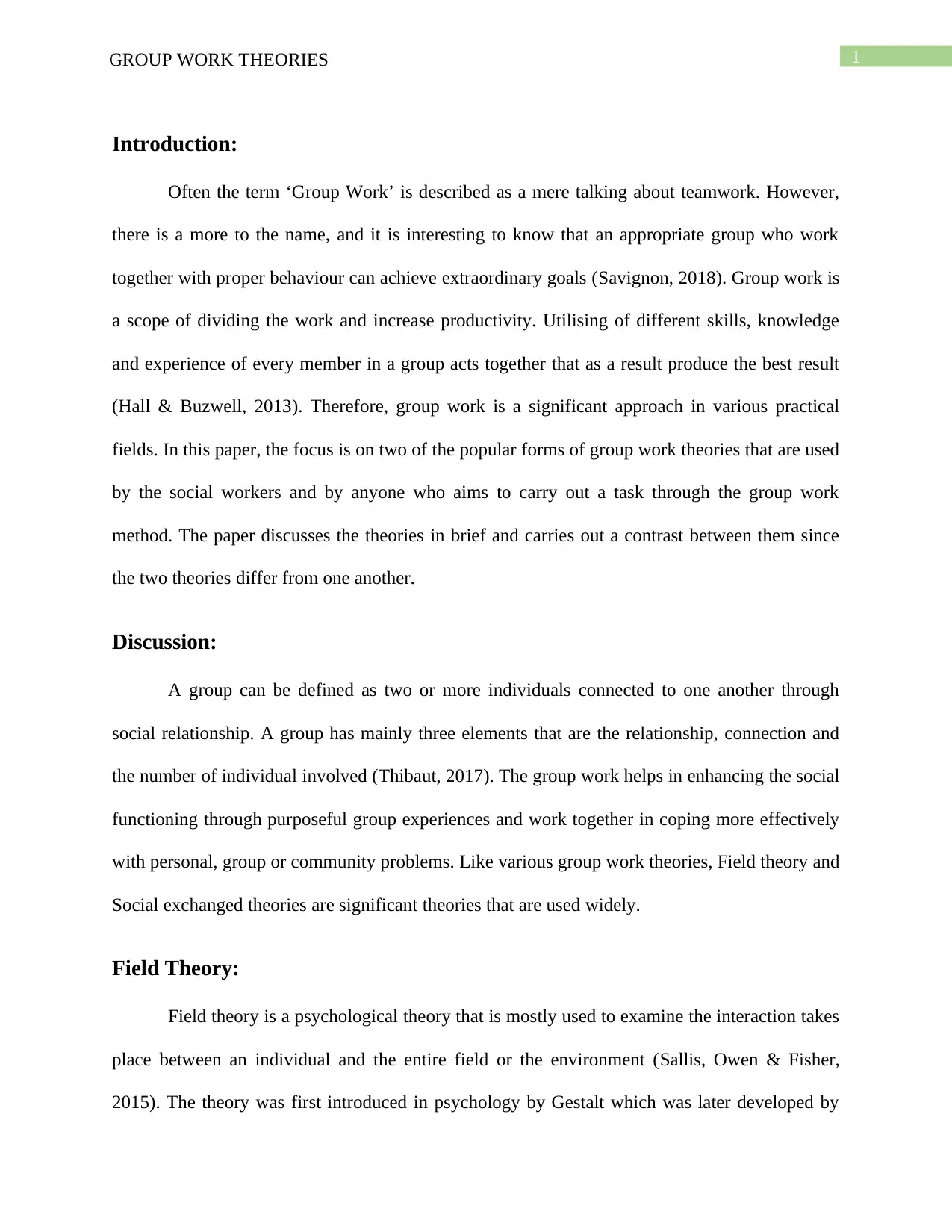
1GROUP WORK THEORIES
Introduction:
Often the term ‘Group Work’ is described as a mere talking about teamwork. However,
there is a more to the name, and it is interesting to know that an appropriate group who work
together with proper behaviour can achieve extraordinary goals (Savignon, 2018). Group work is
a scope of dividing the work and increase productivity. Utilising of different skills, knowledge
and experience of every member in a group acts together that as a result produce the best result
(Hall & Buzwell, 2013). Therefore, group work is a significant approach in various practical
fields. In this paper, the focus is on two of the popular forms of group work theories that are used
by the social workers and by anyone who aims to carry out a task through the group work
method. The paper discusses the theories in brief and carries out a contrast between them since
the two theories differ from one another.
Discussion:
A group can be defined as two or more individuals connected to one another through
social relationship. A group has mainly three elements that are the relationship, connection and
the number of individual involved (Thibaut, 2017). The group work helps in enhancing the social
functioning through purposeful group experiences and work together in coping more effectively
with personal, group or community problems. Like various group work theories, Field theory and
Social exchanged theories are significant theories that are used widely.
Field Theory:
Field theory is a psychological theory that is mostly used to examine the interaction takes
place between an individual and the entire field or the environment (Sallis, Owen & Fisher,
2015). The theory was first introduced in psychology by Gestalt which was later developed by
Introduction:
Often the term ‘Group Work’ is described as a mere talking about teamwork. However,
there is a more to the name, and it is interesting to know that an appropriate group who work
together with proper behaviour can achieve extraordinary goals (Savignon, 2018). Group work is
a scope of dividing the work and increase productivity. Utilising of different skills, knowledge
and experience of every member in a group acts together that as a result produce the best result
(Hall & Buzwell, 2013). Therefore, group work is a significant approach in various practical
fields. In this paper, the focus is on two of the popular forms of group work theories that are used
by the social workers and by anyone who aims to carry out a task through the group work
method. The paper discusses the theories in brief and carries out a contrast between them since
the two theories differ from one another.
Discussion:
A group can be defined as two or more individuals connected to one another through
social relationship. A group has mainly three elements that are the relationship, connection and
the number of individual involved (Thibaut, 2017). The group work helps in enhancing the social
functioning through purposeful group experiences and work together in coping more effectively
with personal, group or community problems. Like various group work theories, Field theory and
Social exchanged theories are significant theories that are used widely.
Field Theory:
Field theory is a psychological theory that is mostly used to examine the interaction takes
place between an individual and the entire field or the environment (Sallis, Owen & Fisher,
2015). The theory was first introduced in psychology by Gestalt which was later developed by
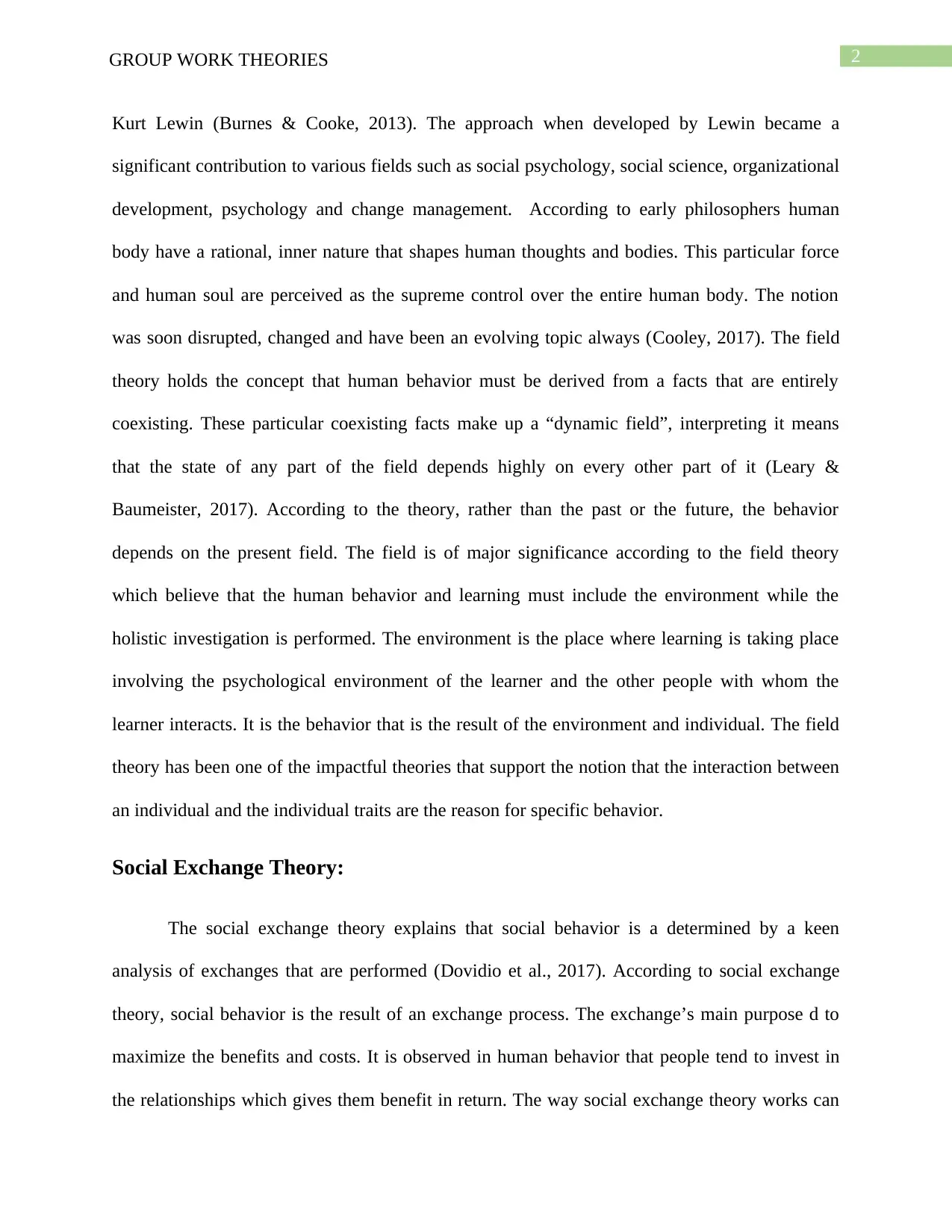
2GROUP WORK THEORIES
Kurt Lewin (Burnes & Cooke, 2013). The approach when developed by Lewin became a
significant contribution to various fields such as social psychology, social science, organizational
development, psychology and change management. According to early philosophers human
body have a rational, inner nature that shapes human thoughts and bodies. This particular force
and human soul are perceived as the supreme control over the entire human body. The notion
was soon disrupted, changed and have been an evolving topic always (Cooley, 2017). The field
theory holds the concept that human behavior must be derived from a facts that are entirely
coexisting. These particular coexisting facts make up a “dynamic field”, interpreting it means
that the state of any part of the field depends highly on every other part of it (Leary &
Baumeister, 2017). According to the theory, rather than the past or the future, the behavior
depends on the present field. The field is of major significance according to the field theory
which believe that the human behavior and learning must include the environment while the
holistic investigation is performed. The environment is the place where learning is taking place
involving the psychological environment of the learner and the other people with whom the
learner interacts. It is the behavior that is the result of the environment and individual. The field
theory has been one of the impactful theories that support the notion that the interaction between
an individual and the individual traits are the reason for specific behavior.
Social Exchange Theory:
The social exchange theory explains that social behavior is a determined by a keen
analysis of exchanges that are performed (Dovidio et al., 2017). According to social exchange
theory, social behavior is the result of an exchange process. The exchange’s main purpose d to
maximize the benefits and costs. It is observed in human behavior that people tend to invest in
the relationships which gives them benefit in return. The way social exchange theory works can
Kurt Lewin (Burnes & Cooke, 2013). The approach when developed by Lewin became a
significant contribution to various fields such as social psychology, social science, organizational
development, psychology and change management. According to early philosophers human
body have a rational, inner nature that shapes human thoughts and bodies. This particular force
and human soul are perceived as the supreme control over the entire human body. The notion
was soon disrupted, changed and have been an evolving topic always (Cooley, 2017). The field
theory holds the concept that human behavior must be derived from a facts that are entirely
coexisting. These particular coexisting facts make up a “dynamic field”, interpreting it means
that the state of any part of the field depends highly on every other part of it (Leary &
Baumeister, 2017). According to the theory, rather than the past or the future, the behavior
depends on the present field. The field is of major significance according to the field theory
which believe that the human behavior and learning must include the environment while the
holistic investigation is performed. The environment is the place where learning is taking place
involving the psychological environment of the learner and the other people with whom the
learner interacts. It is the behavior that is the result of the environment and individual. The field
theory has been one of the impactful theories that support the notion that the interaction between
an individual and the individual traits are the reason for specific behavior.
Social Exchange Theory:
The social exchange theory explains that social behavior is a determined by a keen
analysis of exchanges that are performed (Dovidio et al., 2017). According to social exchange
theory, social behavior is the result of an exchange process. The exchange’s main purpose d to
maximize the benefits and costs. It is observed in human behavior that people tend to invest in
the relationships which gives them benefit in return. The way social exchange theory works can
⊘ This is a preview!⊘
Do you want full access?
Subscribe today to unlock all pages.

Trusted by 1+ million students worldwide
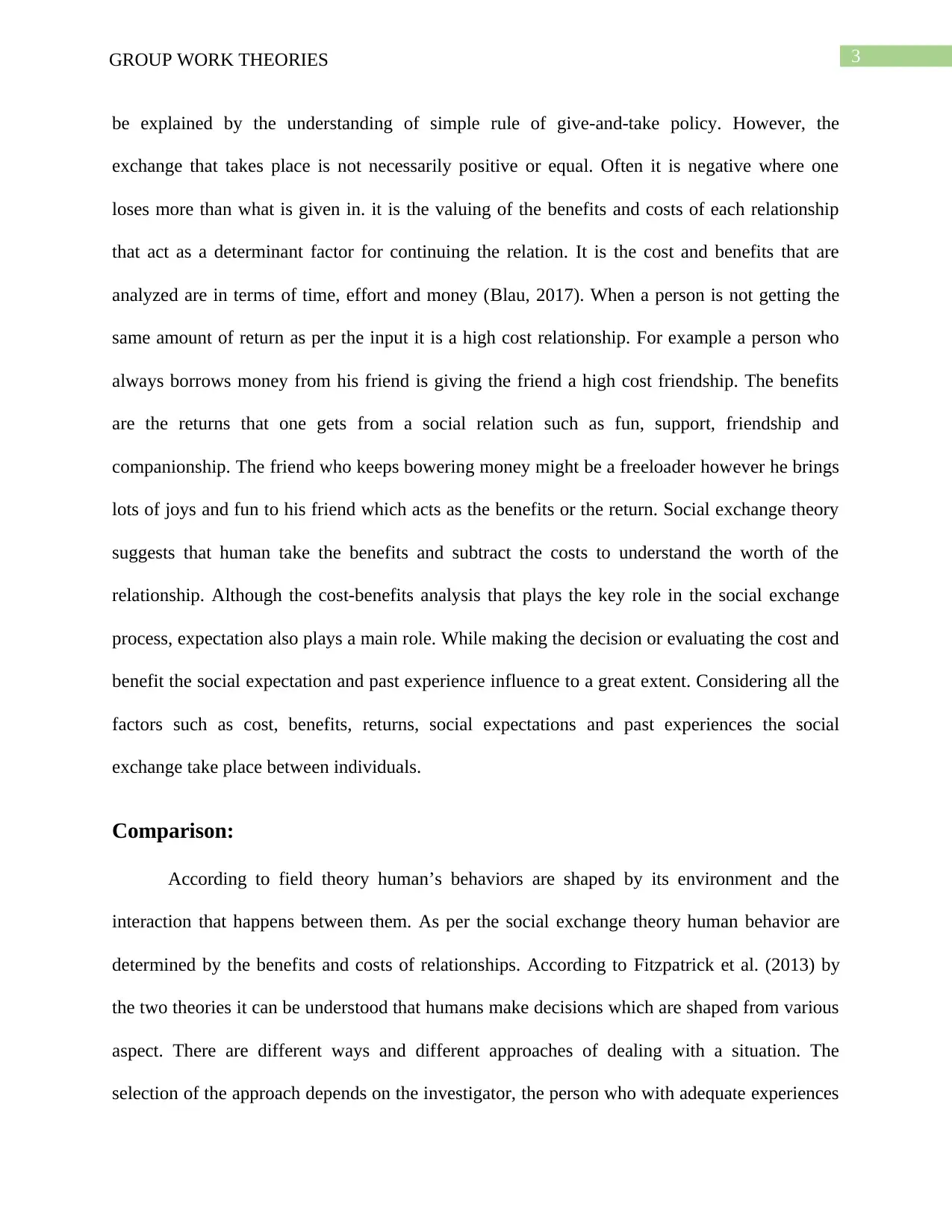
3GROUP WORK THEORIES
be explained by the understanding of simple rule of give-and-take policy. However, the
exchange that takes place is not necessarily positive or equal. Often it is negative where one
loses more than what is given in. it is the valuing of the benefits and costs of each relationship
that act as a determinant factor for continuing the relation. It is the cost and benefits that are
analyzed are in terms of time, effort and money (Blau, 2017). When a person is not getting the
same amount of return as per the input it is a high cost relationship. For example a person who
always borrows money from his friend is giving the friend a high cost friendship. The benefits
are the returns that one gets from a social relation such as fun, support, friendship and
companionship. The friend who keeps bowering money might be a freeloader however he brings
lots of joys and fun to his friend which acts as the benefits or the return. Social exchange theory
suggests that human take the benefits and subtract the costs to understand the worth of the
relationship. Although the cost-benefits analysis that plays the key role in the social exchange
process, expectation also plays a main role. While making the decision or evaluating the cost and
benefit the social expectation and past experience influence to a great extent. Considering all the
factors such as cost, benefits, returns, social expectations and past experiences the social
exchange take place between individuals.
Comparison:
According to field theory human’s behaviors are shaped by its environment and the
interaction that happens between them. As per the social exchange theory human behavior are
determined by the benefits and costs of relationships. According to Fitzpatrick et al. (2013) by
the two theories it can be understood that humans make decisions which are shaped from various
aspect. There are different ways and different approaches of dealing with a situation. The
selection of the approach depends on the investigator, the person who with adequate experiences
be explained by the understanding of simple rule of give-and-take policy. However, the
exchange that takes place is not necessarily positive or equal. Often it is negative where one
loses more than what is given in. it is the valuing of the benefits and costs of each relationship
that act as a determinant factor for continuing the relation. It is the cost and benefits that are
analyzed are in terms of time, effort and money (Blau, 2017). When a person is not getting the
same amount of return as per the input it is a high cost relationship. For example a person who
always borrows money from his friend is giving the friend a high cost friendship. The benefits
are the returns that one gets from a social relation such as fun, support, friendship and
companionship. The friend who keeps bowering money might be a freeloader however he brings
lots of joys and fun to his friend which acts as the benefits or the return. Social exchange theory
suggests that human take the benefits and subtract the costs to understand the worth of the
relationship. Although the cost-benefits analysis that plays the key role in the social exchange
process, expectation also plays a main role. While making the decision or evaluating the cost and
benefit the social expectation and past experience influence to a great extent. Considering all the
factors such as cost, benefits, returns, social expectations and past experiences the social
exchange take place between individuals.
Comparison:
According to field theory human’s behaviors are shaped by its environment and the
interaction that happens between them. As per the social exchange theory human behavior are
determined by the benefits and costs of relationships. According to Fitzpatrick et al. (2013) by
the two theories it can be understood that humans make decisions which are shaped from various
aspect. There are different ways and different approaches of dealing with a situation. The
selection of the approach depends on the investigator, the person who with adequate experiences
Paraphrase This Document
Need a fresh take? Get an instant paraphrase of this document with our AI Paraphraser
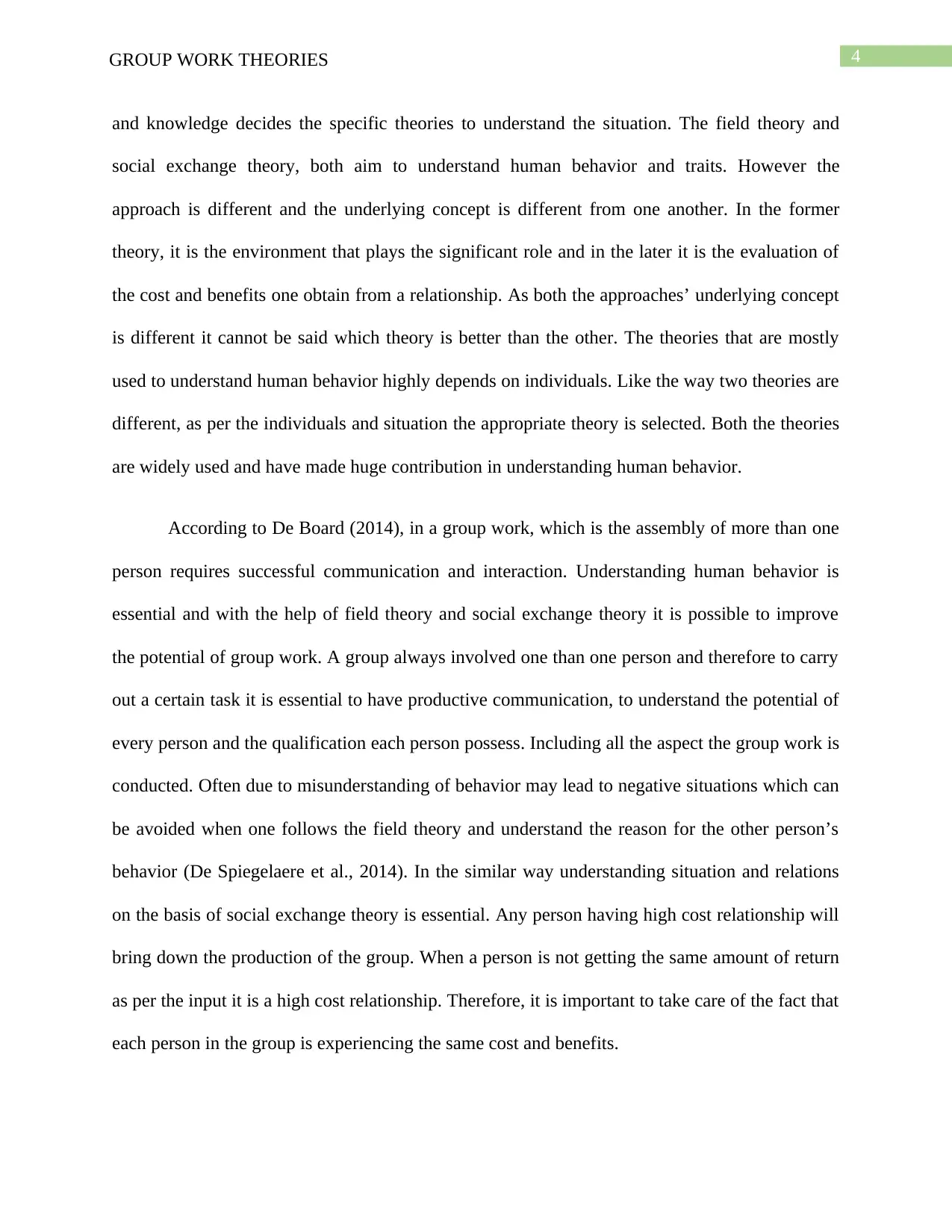
4GROUP WORK THEORIES
and knowledge decides the specific theories to understand the situation. The field theory and
social exchange theory, both aim to understand human behavior and traits. However the
approach is different and the underlying concept is different from one another. In the former
theory, it is the environment that plays the significant role and in the later it is the evaluation of
the cost and benefits one obtain from a relationship. As both the approaches’ underlying concept
is different it cannot be said which theory is better than the other. The theories that are mostly
used to understand human behavior highly depends on individuals. Like the way two theories are
different, as per the individuals and situation the appropriate theory is selected. Both the theories
are widely used and have made huge contribution in understanding human behavior.
According to De Board (2014), in a group work, which is the assembly of more than one
person requires successful communication and interaction. Understanding human behavior is
essential and with the help of field theory and social exchange theory it is possible to improve
the potential of group work. A group always involved one than one person and therefore to carry
out a certain task it is essential to have productive communication, to understand the potential of
every person and the qualification each person possess. Including all the aspect the group work is
conducted. Often due to misunderstanding of behavior may lead to negative situations which can
be avoided when one follows the field theory and understand the reason for the other person’s
behavior (De Spiegelaere et al., 2014). In the similar way understanding situation and relations
on the basis of social exchange theory is essential. Any person having high cost relationship will
bring down the production of the group. When a person is not getting the same amount of return
as per the input it is a high cost relationship. Therefore, it is important to take care of the fact that
each person in the group is experiencing the same cost and benefits.
and knowledge decides the specific theories to understand the situation. The field theory and
social exchange theory, both aim to understand human behavior and traits. However the
approach is different and the underlying concept is different from one another. In the former
theory, it is the environment that plays the significant role and in the later it is the evaluation of
the cost and benefits one obtain from a relationship. As both the approaches’ underlying concept
is different it cannot be said which theory is better than the other. The theories that are mostly
used to understand human behavior highly depends on individuals. Like the way two theories are
different, as per the individuals and situation the appropriate theory is selected. Both the theories
are widely used and have made huge contribution in understanding human behavior.
According to De Board (2014), in a group work, which is the assembly of more than one
person requires successful communication and interaction. Understanding human behavior is
essential and with the help of field theory and social exchange theory it is possible to improve
the potential of group work. A group always involved one than one person and therefore to carry
out a certain task it is essential to have productive communication, to understand the potential of
every person and the qualification each person possess. Including all the aspect the group work is
conducted. Often due to misunderstanding of behavior may lead to negative situations which can
be avoided when one follows the field theory and understand the reason for the other person’s
behavior (De Spiegelaere et al., 2014). In the similar way understanding situation and relations
on the basis of social exchange theory is essential. Any person having high cost relationship will
bring down the production of the group. When a person is not getting the same amount of return
as per the input it is a high cost relationship. Therefore, it is important to take care of the fact that
each person in the group is experiencing the same cost and benefits.
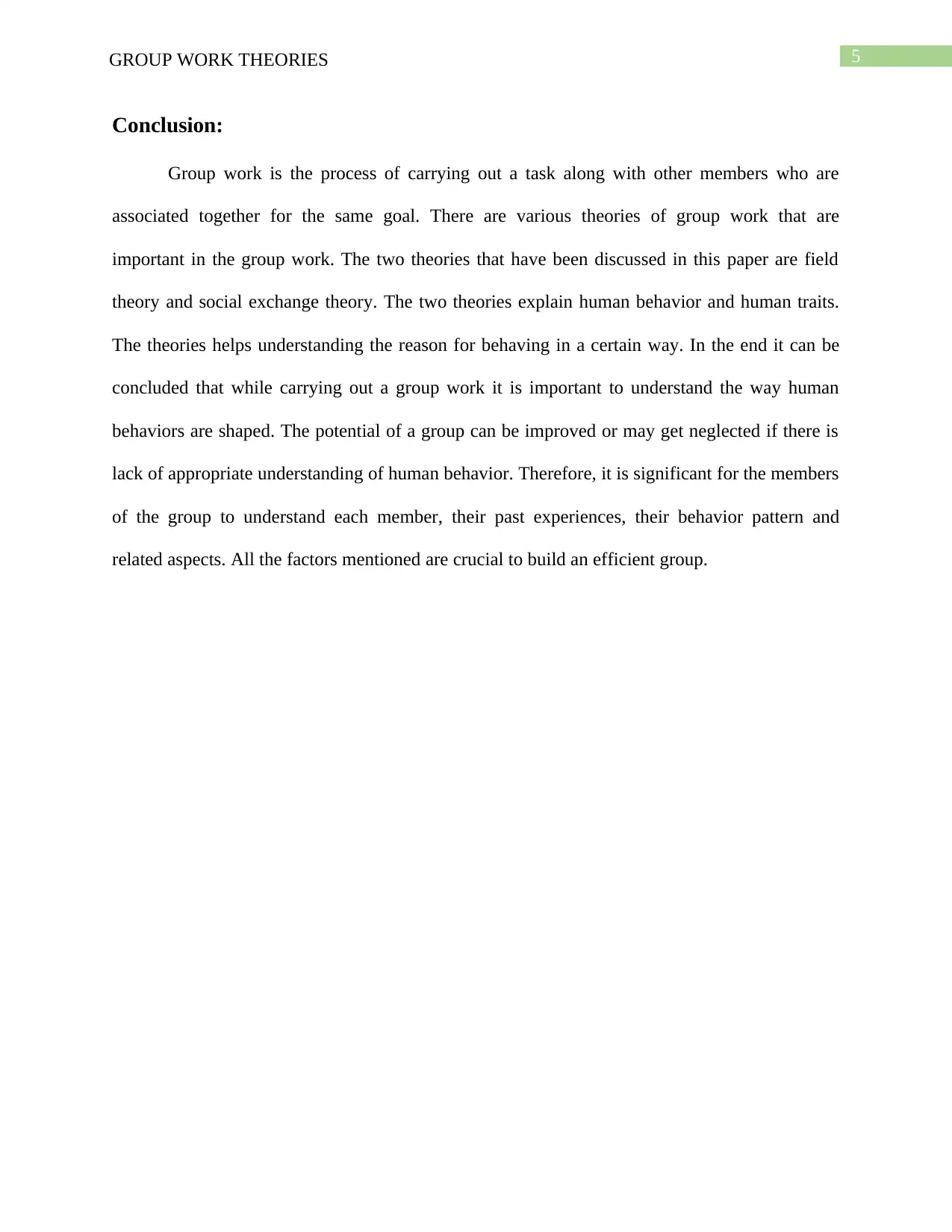
5GROUP WORK THEORIES
Conclusion:
Group work is the process of carrying out a task along with other members who are
associated together for the same goal. There are various theories of group work that are
important in the group work. The two theories that have been discussed in this paper are field
theory and social exchange theory. The two theories explain human behavior and human traits.
The theories helps understanding the reason for behaving in a certain way. In the end it can be
concluded that while carrying out a group work it is important to understand the way human
behaviors are shaped. The potential of a group can be improved or may get neglected if there is
lack of appropriate understanding of human behavior. Therefore, it is significant for the members
of the group to understand each member, their past experiences, their behavior pattern and
related aspects. All the factors mentioned are crucial to build an efficient group.
Conclusion:
Group work is the process of carrying out a task along with other members who are
associated together for the same goal. There are various theories of group work that are
important in the group work. The two theories that have been discussed in this paper are field
theory and social exchange theory. The two theories explain human behavior and human traits.
The theories helps understanding the reason for behaving in a certain way. In the end it can be
concluded that while carrying out a group work it is important to understand the way human
behaviors are shaped. The potential of a group can be improved or may get neglected if there is
lack of appropriate understanding of human behavior. Therefore, it is significant for the members
of the group to understand each member, their past experiences, their behavior pattern and
related aspects. All the factors mentioned are crucial to build an efficient group.
⊘ This is a preview!⊘
Do you want full access?
Subscribe today to unlock all pages.

Trusted by 1+ million students worldwide
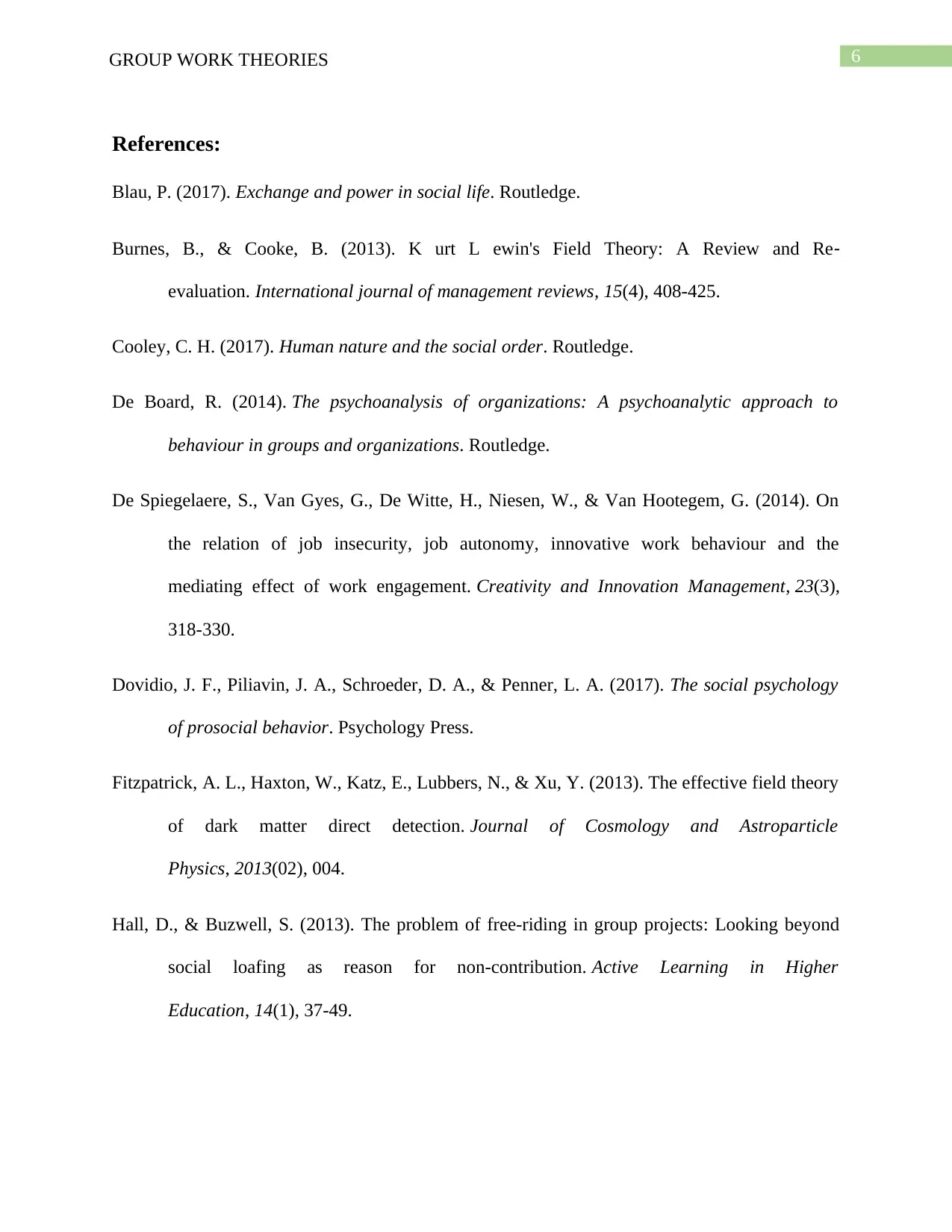
6GROUP WORK THEORIES
References:
Blau, P. (2017). Exchange and power in social life. Routledge.
Burnes, B., & Cooke, B. (2013). K urt L ewin's Field Theory: A Review and Re‐
evaluation. International journal of management reviews, 15(4), 408-425.
Cooley, C. H. (2017). Human nature and the social order. Routledge.
De Board, R. (2014). The psychoanalysis of organizations: A psychoanalytic approach to
behaviour in groups and organizations. Routledge.
De Spiegelaere, S., Van Gyes, G., De Witte, H., Niesen, W., & Van Hootegem, G. (2014). On
the relation of job insecurity, job autonomy, innovative work behaviour and the
mediating effect of work engagement. Creativity and Innovation Management, 23(3),
318-330.
Dovidio, J. F., Piliavin, J. A., Schroeder, D. A., & Penner, L. A. (2017). The social psychology
of prosocial behavior. Psychology Press.
Fitzpatrick, A. L., Haxton, W., Katz, E., Lubbers, N., & Xu, Y. (2013). The effective field theory
of dark matter direct detection. Journal of Cosmology and Astroparticle
Physics, 2013(02), 004.
Hall, D., & Buzwell, S. (2013). The problem of free-riding in group projects: Looking beyond
social loafing as reason for non-contribution. Active Learning in Higher
Education, 14(1), 37-49.
References:
Blau, P. (2017). Exchange and power in social life. Routledge.
Burnes, B., & Cooke, B. (2013). K urt L ewin's Field Theory: A Review and Re‐
evaluation. International journal of management reviews, 15(4), 408-425.
Cooley, C. H. (2017). Human nature and the social order. Routledge.
De Board, R. (2014). The psychoanalysis of organizations: A psychoanalytic approach to
behaviour in groups and organizations. Routledge.
De Spiegelaere, S., Van Gyes, G., De Witte, H., Niesen, W., & Van Hootegem, G. (2014). On
the relation of job insecurity, job autonomy, innovative work behaviour and the
mediating effect of work engagement. Creativity and Innovation Management, 23(3),
318-330.
Dovidio, J. F., Piliavin, J. A., Schroeder, D. A., & Penner, L. A. (2017). The social psychology
of prosocial behavior. Psychology Press.
Fitzpatrick, A. L., Haxton, W., Katz, E., Lubbers, N., & Xu, Y. (2013). The effective field theory
of dark matter direct detection. Journal of Cosmology and Astroparticle
Physics, 2013(02), 004.
Hall, D., & Buzwell, S. (2013). The problem of free-riding in group projects: Looking beyond
social loafing as reason for non-contribution. Active Learning in Higher
Education, 14(1), 37-49.
Paraphrase This Document
Need a fresh take? Get an instant paraphrase of this document with our AI Paraphraser
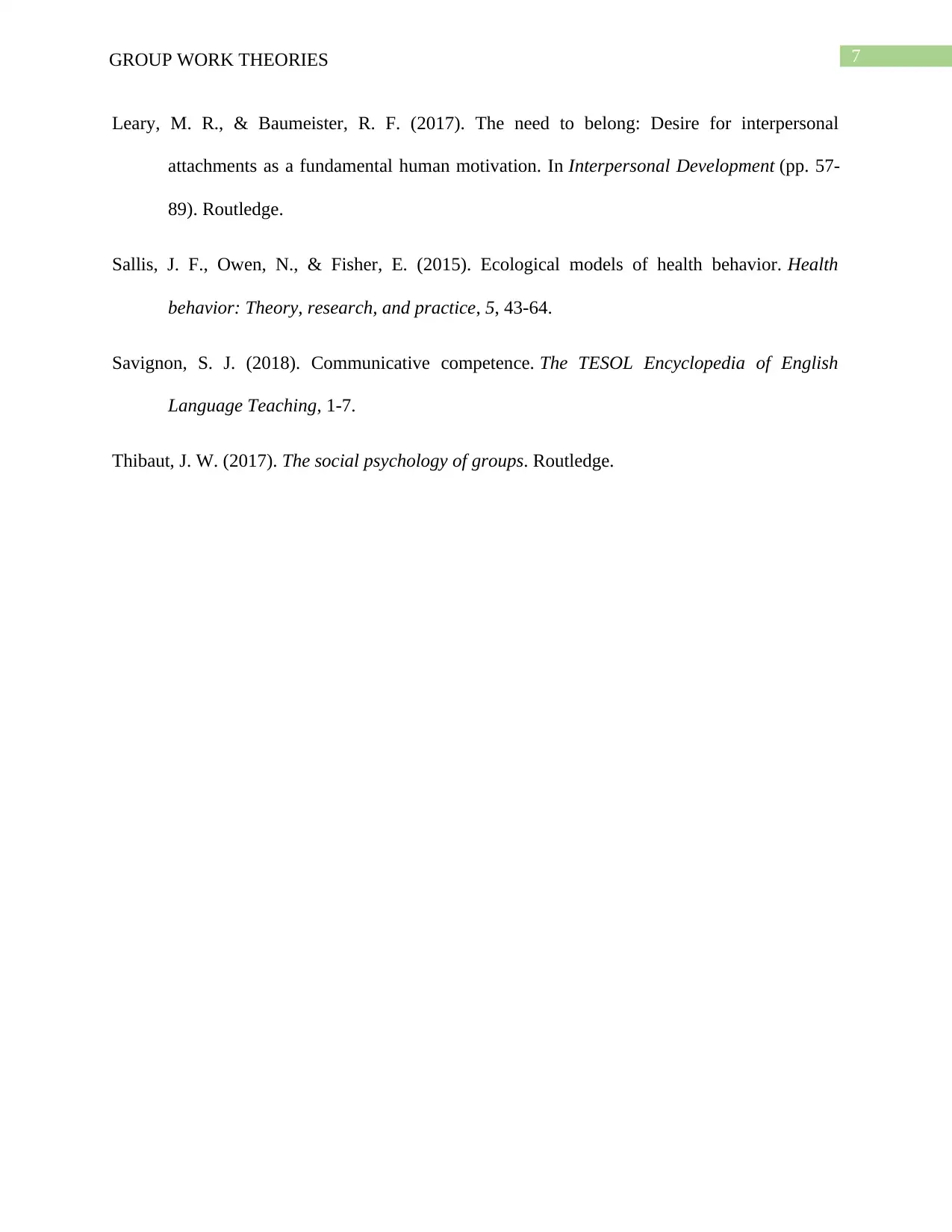
7GROUP WORK THEORIES
Leary, M. R., & Baumeister, R. F. (2017). The need to belong: Desire for interpersonal
attachments as a fundamental human motivation. In Interpersonal Development (pp. 57-
89). Routledge.
Sallis, J. F., Owen, N., & Fisher, E. (2015). Ecological models of health behavior. Health
behavior: Theory, research, and practice, 5, 43-64.
Savignon, S. J. (2018). Communicative competence. The TESOL Encyclopedia of English
Language Teaching, 1-7.
Thibaut, J. W. (2017). The social psychology of groups. Routledge.
Leary, M. R., & Baumeister, R. F. (2017). The need to belong: Desire for interpersonal
attachments as a fundamental human motivation. In Interpersonal Development (pp. 57-
89). Routledge.
Sallis, J. F., Owen, N., & Fisher, E. (2015). Ecological models of health behavior. Health
behavior: Theory, research, and practice, 5, 43-64.
Savignon, S. J. (2018). Communicative competence. The TESOL Encyclopedia of English
Language Teaching, 1-7.
Thibaut, J. W. (2017). The social psychology of groups. Routledge.
1 out of 8
Related Documents
Your All-in-One AI-Powered Toolkit for Academic Success.
+13062052269
info@desklib.com
Available 24*7 on WhatsApp / Email
![[object Object]](/_next/static/media/star-bottom.7253800d.svg)
Unlock your academic potential
Copyright © 2020–2026 A2Z Services. All Rights Reserved. Developed and managed by ZUCOL.




